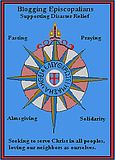on reformations
A couple of weeks ago I had the pleasure of hearing Phyllis Tickle give three keynote addresses to our annual ECW conference here in the diocese of Oklahoma.I haven't posted much about it because I've been digesting what she had to say since then.
Over her three talks, she built up a thesis that we are in the middle of another Reformation--a thesis that says that the common ideas underpinning the Reformation and modernity that we share in North Americahave been eaten away by various events over the past hundred years. She believes that Emergent or Emerging or what have you is at the center of this new Reformation, and that all of us are going to be affected by it, and have to choose what we're going to do about it in the next ten to twelve years.
The major common understanding of the past Reformation, she said, was about "sola Scriptura," scripture alone. And that's why we're fighting now about "the plain meaning of Scripture" and "scriptural authority." She divided North American Christianity into four quadrants, around a cross (with overlapping bits on each side): liturgical and social justice denominations on the top parts of the cross, who are concerned with orthopraxy, or doing the right things, and charismatic and conservative (that was the best word she said she could come up with), who are concerned with orthodoxy, or believing the right things. Roman Catholics, Episcopalians, Lutherans would be in the liturgical bit--and our orthopraxy is about the right way to worship. Presbyterians, Methodists, our mainline Protestants would be in the social justice side--activities like Habitat etc. are examples of orthopraxy (she wanted to be clear this was about emphasis, NOT exclusivity). Charismatics and conservatives get their authority from different places--one from the Spirit and one from the Bible.
according to her, the new reformation is taking place at the center of the cross--i.e. as in Brian McLaren's book, "Generous Orthodoxy," where he talks about how he is formed by each of these traditions.
Each denomination is fighting right now. Everyone is affected. The outcome, she believes, is that 10% of our congregations are going to split off and form splinter groups who will hang on to "sola scriptura." The rest of us are going to be divided into those who become completely Emergent, partially Emergent, and those who re-vision their traditions.
Her talk explained a lot for me, like why we, in the Episcopal Church, are suddenly talking about the 39 Articles, a Reformation document. And why it seems like some of us are in completely different churches even within the same tradition.
One of the best things about her talk was she tried to take the sting out of it--this isn't bad or good, it simply IS. This change is happening--we can't stop it, we just need to decide where we are in it.
I'd be curious to hear what other's reactions are to this admittedly limited retelling of three plus hours of keynote addresses. . .

























4 Comments:
I wish I could have been there! Is there any reading material other than McLaren's book?
Some of this is in Phyllis Tickle's "God-Talk in America," she also mentioned Diana Butler Bass and Tony Jones (? -- I think).
I don't have my notes in front of me. I'll see what I can dig up.
I've been browsing around on emergentvillage.com, there's a LOT of material on there.
That is a fascinating analysis. I've heard others call what is going on now , especially in the Episcopal Church, a "new reformation" but never heard it analyzed like that.
I've been watching the Via Media dvds in anticipation of starting the program in our parish in the fall, and I've really like Phyllis Tickle's contributions to that as well. I'll have to check out her book.
I'm jealous; would love to hear Trible.
Is a graphic available for this cross, perhaps in the God-Talk book? I seem to have all the churches in the upper left (RC, Episc, Luth) or upper right (Presb, UM), but none in the lower left or lower right (that is, none in the lower, orthodoxy half of things).
I guess I'll finally have to go off and figure out what Emerging is. Wikipedia didn't help me much.
Post a Comment
<< Home